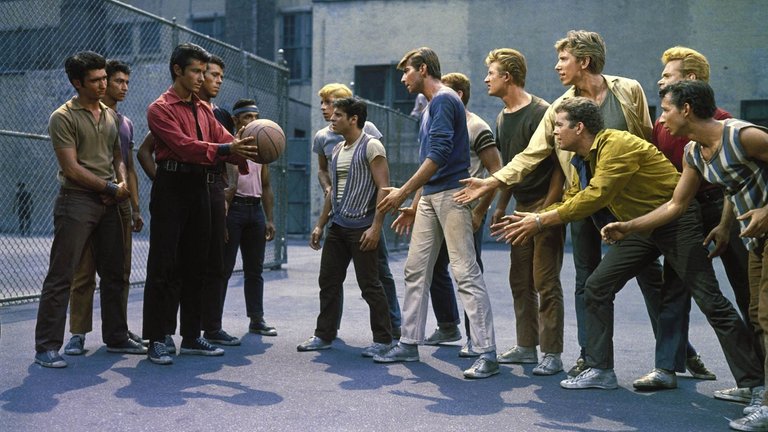Film Review: West Side Story (1961)

For some cinephiles, 1960s Hollywood represents an empire in decline, with once grand studios struggling to meet the challenge of television, foreign art films, grindhouse cinema, and the incomprehensible tastes of the generation that would later become known as Boomers. Grand musicals are often considered prime examples of this disconnect, often seen as white elephants that almost brought Hollywood to ruin until being rescued by fresh blood like Coppola and Spielberg. However, the same decade can actually be seen as the Golden Age of Musicals, at least judging by the films that were winning Oscars, smashing box office records, and ultimately earning their reputations as the classics of the genre. One could argue that this trend was initiated by West Side Story, the 1961 film directed by Robert Wise, which is now celebrated as one of the greatest musicals ever made and arguably the finest adaptation of a Shakespearean play.
The film is a screen adaptation of the 1957 Broadway musical conceived by choreographer Jerome Robbins, composed by Leonard Bernstein, and written by lyricist Stephen Sondheim and playwright Arthur Laurents. The play was a loose adaptation of Shakespeare's famous tragedy Romeo and Juliet, set in contemporary New York City and its milieu of juvenile delinquent street gangs.
The film version begins in 1957 at the Upper West Side in Manhattan and chronicles the conflict between two rival gangs – the Jets, who are white and led by Riff (played by Russ Tamblyn), and the Sharks, who are Puerto Rican and led by Bernardo (played by George Chakiris). Tensions between the two gradually escalate despite the efforts of the police, led by Lieutenant Schrank (played by Simon Oakland), to keep the peace. Both sides agree to settle the matter in a "rumble" during which they might use knives, zip guns, and similar weapons. Tony (played by Richard Beymer), a former Jet, comes to the dance to support his best friend Riff, but he hopelessly falls in love with Maria (played by Natalie Wood), Bernardo's younger sister. Their love, which instantly smashes ethnic and racial barriers, gives them a few moments of happiness, but their love is short-lived because the violence and hatred of their peers conspire to lead to tragedy.
While many great films require some time for their greatness to be properly acknowledged, there was no such doubt in the case of West Side Story. The film, which had been the box office hit of the year, had its commercial success confirmed by ten Oscars out of eleven nominations, not including an honorary award for Jerome Robbins.
This success can be best explained by the perfect blend of familiar, typically American genre and new, refreshing approaches to cinematic narrative, which built on the stage principles of "razzmatazz and realism" that served the musical authors so well. In other words, West Side Story was the epic "larger than life" film that, instead of providing simple escapist entertainment, was set in a rather banal setting of a "problematic" New York City neighbourhood and dealt with some important and potentially unpleasant issues like youth crime and racial prejudice.
For this concept to work, Wise, who also produced the film, needed to compensate for the lack of escapist content with the talents that would somehow make the prosaic reality not only interesting but "magical." He was fortunate to gather such talents – brilliant composer Leonard Bernstein, brilliant lyricist Stephen Sondheim, and brilliant choreographer Jerome Robbins – who had all already proven themselves in the stage version. Their talents were added by cinematographer Daniel L. Fapp, who managed to make the seemingly banal and dark story interesting through bright colors, helped by excellent production and costume design.
The opening scene, in which menacing youth gangs threaten, fight, and intimidate each other through brilliantly choreographed interpretative dance, is one of the best examples of West Side Story at its best. The dance is both surreal and realistic at the same time. While there are also memorable scenes later in the film, the dance is actually more impressive than the music itself, although Bernstein indeed created some memorable songs that became pop standards like "Maria," "Tonight," "America," and "Somewhere" with lyrics that provide both melodrama and social commentary.
While generally regarded as one of the grand classics of American cinema, West Side Story nevertheless has certain detractors, and its flaws usually point towards casting. Both Richard Beymer and Natalie Wood, who play the doomed lovers, had limited vocal abilities and had to have their songs performed by someone else. Wood, despite all her efforts, doesn't look that convincing as Puerto Rican, and Rita Moreno, the actual Puerto Rican who plays her best friend Anita, makes this casting choice close to "whitewashing" according to some of today's "woke" standards. Yet, Wood indeed plays her role well and Maria represents one of the best performances of her relatively short career. On the other hand, Beymer, who would decades later reunite with Russ Tamblyn as a cast member of Twin Peaks, was quite displeased with the film and especially his own performance.
Despite these flaws and despite the passage of almost six decades, the original version of West Side Story looks incredibly modern and can be recommended for today's audience. Steven Spielberg's 2021 remake, in retrospect, should be better interpreted as an homage rather than a genuine attempt to match Robert Wise's achievement.
RATING: 8/10 (+++)
Blog in Croatian https://draxblog.com
Blog in English https://draxreview.wordpress.com/
InLeo blog https://inleo.io/@drax.leo
Hiveonboard: https://hiveonboard.com?ref=drax
Rising Star game: https://www.risingstargame.com?referrer=drax
1Inch: https://1inch.exchange/#/r/0x83823d8CCB74F828148258BB4457642124b1328e
BTC donations: 1EWxiMiP6iiG9rger3NuUSd6HByaxQWafG
ETH donations: 0xB305F144323b99e6f8b1d66f5D7DE78B498C32A7
BCH donations: qpvxw0jax79lhmvlgcldkzpqanf03r9cjv8y6gtmk9
Posted Using InLeo Alpha